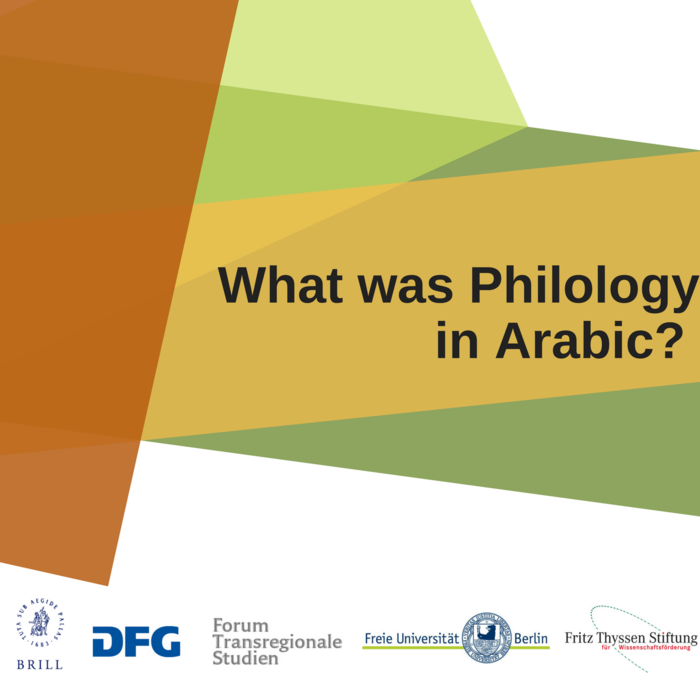
04 Jul What was philology in Arabic?
Entre los días 13 y 15 de julio de 2017 se celebrará la conferencia internacional «What was Philology in Arabic? Arabic-Islamic Textual Practices in the Early Modern World» en la Universidad Freie de Berlín, organizado por el grupo de investigación «Arabic Philology and Textual Practices in the Early Modern Period» del Seminar für Semitistik und Arabistik de dicha Universidad.
Durante los tres días que dure este congreso, los diferentes participantes se centrarán en analizar las prácticas textuales arabo-islámicas, la aparición y el desarrollo de los textos árabes e integrar estas prácticas textuales en una perspectiva global.
Las personas que estén interesadas en asistir, deberán realizar la inscripción online a través del siguiente enlace: https://ssl2.cms.fu-berlin.de/geschkult/en/e/semiarab/arabistik/whatwasphilology/contact/PM_registration/index.html
Thursday, 13 July 2017
9:00 – 9:30: Arrival and Coffee
9:30 – 10:00
Islam Dayeh (Freie Universität Berlin) – What was Philology in Arabic? Some Preliminary Notes
Kathy van Vliet (Brill), Islam Dayeh (Freie Universität Berlin) – Launch of Philological Encounters (Brill)
10:00 – 11:00
Lara Harb (Princeton University)
Philology and Aesthetics in ʿIlm al-maʿānī
11:00 – 11:30: Coffee Break
11:30 – 12:30
Adam Talib (Durham University)
Emblematic or Exceptional? aṣ-Ṣafadī’s Ghayth and ad-Damāmīnī’s Nuzūl
12:30 – 1:30
Mykhaylo Yakubovych (The National University of Ostroh Academy)
Tafsīr Glosses in the Ottoman Tradition
1:30 – 3:00: Lunch Break
3:00 – 4:00
Asad Q. Ahmed (University of California, Berkeley)
Palimpsests of Themselves: Commentaries and Glosses in Post-Classical Islam
4:00 – 4:30: Coffee Break
4:30 – 5:30
Ahmed El Shamsy (University of Chicago)
Anti-Philology in the Arabo-Islamic Tradition in the Sixteenth to Nineteenth Centuries
5:30 – 6:30
Ridwan al-Sayyid (Higher Institute for Islamic Studies, Beirut)
Islamic Studies and the Return to Philology
Friday, 14 July 2017
9:30 – 10:30
Bilal Orfali (American University of Beirut)
Black Humor and Qurʾānic References in Hamadhānī’s al-Maqāma al-Mawṣiliyya
10:30 – 11:00: Coffee Break
11:00 – 12:00
Maria Mavroudi (University of California, Berkeley)
Byzantine Translations from Arabic into Greek
12:00 – 1:00
José Martínez Delgado (Universidad de Granada)
The Hebrew Word-Lore and the Judeo-Arabic Lexicography in al-Andalus (10th-15th Centuries)
1:00 – 2:30: Lunch Break
2:30 – 3:30
Christopher Bahl (SOAS, University of London)
The Circulation of al-Damāmīnī’s Grammar Commentaries Across the Western Indian Ocean
3:30 – 4:30
Torsten Tschacher (Freie Universität Berlin)
The Limited Universal: Arabic through a Tamil Lens
4:30 – 5:00: Coffee Break
5:00 – 6:00
Ahmad Khan (Universität Hamburg)
Islam in an Age of Print: Editors, Antiquarianism, and a Republic of Letters
6:00 – 7:00
Jonathan Brown (Georgetown University)
How British Translators in India Revolutionized (Accidentally) Islamic Legal History
Saturday, 15 July 2017
9:30 – 10:30
Konrad Hirschler (Freie Universität Berlin)
Philology and Multiple-Text Manuscripts in the Middle Period
10:30 – 11:30
Shamil Jeppie (University of Cape Town)
The Making of a Timbuktu Biographical Dictionary
11:30 – 12:00: Coffee Break
12:00 – 1:00
Kathryn A. Schwartz (Harvard University)
The Role of the Commissioner in Canonizing the Printed Canon
1:00 – 3:00: Lunch
Lugar de celebración:
Room -1.2009
Building ‘Holzlaube’
Freie Universität Berlin
Fabeckstr. 23-25
14195 Berlin
Información orginial:
The international conference «What was Philology in Arabic? Arabic-Islamic Textual Practices in the Early Modern World» will investigate the neglected history of Arabic-Islamic textual practices and interpretative methods in the early modern world from a global and comparative perspective.
Although philology has always been a global knowledge practice, no such account of its history has ever been written. Indeed, wherever texts exist, a method of making sense of them has existed as well.
What forms did these methods take in Arabic-Islamic scholarship before the encounter with European philology? How do salient aspects of the philological method, such as care for textual difference and variation, attention to contingency and change, and the need to make texts accessible and available, appear in Arabic philology, and what has become of them after this encounter?
The conference is generously funded by the Fritz Thyssen Foundation and the German Research Foundation (DFG).
Fuente de la información y la imagen: Freie Universität Berlin



No Comments